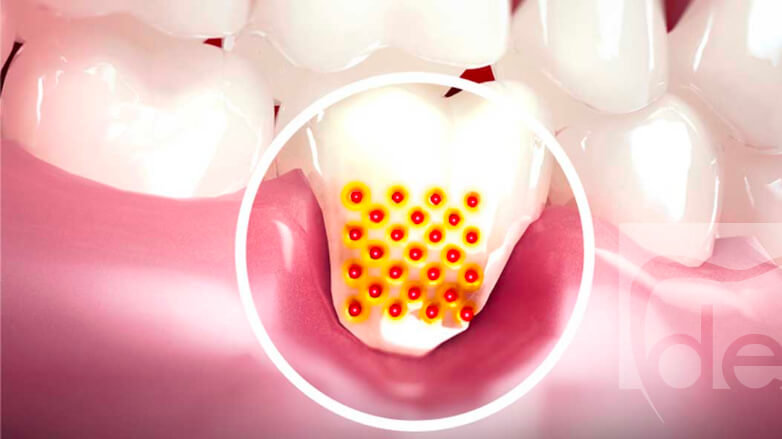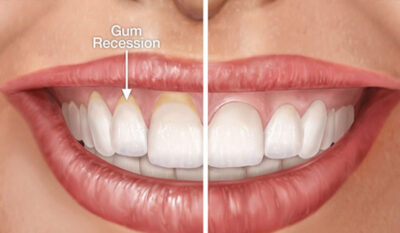Gingival Recession Causes, Consequences, and Solutions
All About Dental Treatments in Turkey

Gingival recession occurs when the gums pull away from the teeth and can affect your oral health. This condition can affect both the upper and lower jaws. Teeth with gingival recession are more prone to decay. These teeth become sensitive when eating, brushing teeth and consuming liquids. Because of these possibilities, it is important that you take steps to ensure that gum recession does not become a problem in your life. Below are some causes, consequences and solutions for gum recession.
The Causes Of Gingival Recession
- Most commonly, gingival recession is caused by gum disease. Gingivitis is an inflammation of the gums that results in irritations and sores on the gum tissue. This can lead to a loss of the attachment fibers between your teeth and your gum tissue. In addition to periodontal disease,
- Aggressive tooth brushing,
- Trauma or injury to your gum tissue,
- Hormonal changes in women
- Abnormal tooth positioning,
- Family history of gum disease
- Smoking or chewing tobacco use,
- Diabetes, HIV,
Lip and tongue piercings also cause gingival recession. If you want more information about how to stop receding gums or other dental concerns, call now for an appointment with one of our dentists!
Gingival Recession Symptoms
Most people do not even know they have a problem until they are experiencing some discomfort or have a routine dental exam with the dentist. Symptoms of receding gums include:
- Glossy, deep red or purple colored of the gums
- Swelling of the gums
- Feeling pain while chewing
- Bad breath
- Gaps between teeth over time
- Gap between teeth and gums over time
- Down-drown gums that make teeth appear longer than normal
- Gums bleeding easily when flossing or brushing
- Sensitivity to cold and heat
- Loosening and shaking of teeth
- Tooth loss (even in healthy teeth)
- Teeth not acting in harmony with each other when biting or chewing food
- Gums bleeding very easily
Symptoms may not be the same for everyone, or not all symptoms may be seen in every individual. Therefore, if you suspect that you have a gingival recession problem, call our office and make an appointment!
Ways to Prevent Receding Gums
To prevent receding gums, you should maintain a balanced oral hygiene routine. Brush twice daily with fluoride toothpaste; visit your dentist regularly for professional cleanings to remove dental plaque and tartar buildup; consume healthy foods such as fruits, vegetables, nuts, seeds that are high in fiber; limit sugary treats like candy or cake for special occasions only. Additionally it is important to avoid sucking on hard or sticky items such as pens or taffy because this can also lead to gum recession.
How can I reduce sensitivity caused by gum recession?
People with gum recession have pain or sensitivity problems. The reason for this is that the tooth roots exposed by gingival recession are not covered with protective enamel. Your dentist can reduce the discomfort associated with gum recession by applying fluoride varnish or other desensitizing agents. You can also use a desensitizing toothpaste. Your dental hygienist may use anesthesia to prevent hypersensitivity during your dental cleaning and to make you more comfortable.
What is the best toothpaste for gum recession?
Desensitizing toothpastes containing active ingredients such as potassium nitrate, stannous fluoride, arginine, and strontium chloride can help alleviate the discomfort associated with gum recession. These components provide relief by blocking the tubules leading to the nerves inside your teeth or by desensitizing the nerves. The desensitizing toothpaste takes effect a few weeks after starting to use it.
Gum Recession Treatment in Turkey
Treatment for gum recession varies depending on what’s causing the condition. Mild cases of gingival recession can be cured with non-surgical treatments such as topical antibiotics, antimicrobial mouthwash, antiseptic chips, enzyme suppressants, tooth bonding or orthodontics. However, in advanced cases, gum recession surgery is needed to completely correct the problem.
Non-surgical treatments for gum recession:
Topical antibiotics, antiseptic chips. If gum recession is caused by periodontal disease, scaling and root surface cleaning (deep tooth cleaning) can be performed under local anesthesia to get rid of harmful bacteria that cause gum disease deep within the gum line. Sometimes your periodontist (gum specialist) may place an antibiotic gel, antiseptic chip under your gums to help treat gum disease. Your dentist or hygienist will guide you on how to be more effective at cleaning your teeth.
Tooth bonding. Your dentist can help reduce your sensitivity by camouflaging the extraction area with tooth-colored composite resin. This provides an aesthetically better appearance by covering your exposed tooth root.
Orthodontics. If a tooth is crooked, tipped, or rotated, it can cause gum recession. When the tooth is properly aligned, gingival recession can correct itself over time. In these cases, braces may be good treatment option.
Gum graft surgery:
Gingival recession surgery performed by a periodontist (gingival specialist) is the most predictable and long-term treatment option for gingival recession. There are several different gum grafting procedures. Your surgeon will determine which surgical method is right for your situation.
During this surgery, a gum graft is used to replace your missing gum tissue. Usually the gum is transplanted from the palate, since the histological properties of the hard palate are considered to be identical to those of the gum near the tooth neck. Once the gum graft is in the proper position, your surgeon stitches it into the gingival tissues. Then this area treated by special antiseptic and regenerating solutions.
How long does it take to recover from gum grafting surgery?

Your recovery time will depend on several factors, including what type of grafting was done, how many teeth were treated, and where the gum graft came from. In most cases, people who have had gum recession surgery will return to normal within a week or two. Your surgeon will give you detailed postoperative instructions to ensure a comfortable and successful recovery.
Prices of gum graft surgery in Turkey
You can have your treatment at our dental clinic in Turkey at much affordable than the prices in your country. You can come here as early as you want or stay here after your treatment and turn your treatment into a holiday experience.
The price of gum graft surgery depends on the scope of the work to be done. After the consultation, your dentist will be able to define your gum problem and give detailed information about the scope and price of the operation.
Your treatment will be performed by one of the best periodontist in our dental clinic, which is one of the most prestigious dental centres in Turkey. Dental Excellence Turkey has the high quality materials, modern equipment and tools necessary for performing gum graft surgery. You can contact our patient coordinators about all issues related to your treatment process and after.
Call us now and get your special price offer! You can access our contact information from the Contact Us section.
START YOUR JOURNEY
Tell our specialist dentists about your teeth and get a free treatment plan.










